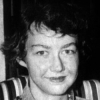Flannery O'Connor

Flannery O'Connor
Mary Flannery O'Connorwas an American writer and essayist. An important voice in American literature, she wrote two novels and 32 short stories, as well as a number of reviews and commentaries. She was a Southern writer who often wrote in a Southern Gothic style and relied heavily on regional settings and grotesque characters. Her writing also reflected her own Roman Catholic faith and frequently examined questions of morality and ethics. Her posthumously-compiled Complete Stories won the 1972 U.S. National Book...
NationalityAmerican
ProfessionNovelist
Date of Birth25 March 1925
CitySavannah, GA
CountryUnited States of America
I am a Catholic not like someone else would be a Baptist or a Methodist, but like someone else would be an atheist.
The Catholic novelist in the South will see many distorted images of Christ, but he will certainly feel that a distorted image of Christ is better than no image at all. I think he will feel a good deal more kinship with backwoods prophets and shouting fundamentalists than he will with those politer elements for whom the supernatural is an embarrassment and for whom religion has become a department of sociology or culture or personality development.
All human nature vigorously resists grace because grace changes us and the change is painful.
Many of my ardent admirers would be roundly shocked and disturbed if they realized that everything I believe is thoroughly moral, thoroughly Catholic, and that it is these beliefs that give my work its chief characteristics.
The Catholic writer, in so far as he has the mind of the Church, will feel life from the standpoint of the central Christian mystery; that it has, for all its horror, been found by God to be worth dying for.
If you're a Catholic you believe what the Church teaches and the climate makes no difference.
The two worst sins of bad taste in fiction are pornography and sentimentality. One is too much sex and the other too much sentiment.
Go warn the children of God of the terrible speed of mercy,
Even in the life of a Christian, faith rises and falls like the tides of an invisible sea. It's there, even when he can't see it or feel it, if he wants it to be there. You realize, I think, that it is more valuable, more mysterious, altogether more immense than anything you can learn or decide upon It will keep you free - not free to do anything you please, but free to be formed by something larger than your own intellect or the intellects around you.
I feel that discussing story-writing in terms of plot, character, and theme is like trying to describe the expression on a face by saying where the eyes, nose, and mouth are.
It is popular to believe that in order to see clearly one must believe nothing. This may work well enough if you are observing cells under a microscope. It will not work if you are writing fiction. For the fiction writer, to believe nothing is to see nothing.
There is a question whether faith can or is supposed to be emotionally satisfying. I must say that the thought of everyone lolling about in an emotionally satisfying faith is repugnant to me. I believe that we are ultimately directed Godward but that this journey is often impeded by emotion
Either practice restraint or be prepared for crowding
There won't be any biographies of me because, for only one reason, lives spent between the house and the chicken yard do not make exciting copy.